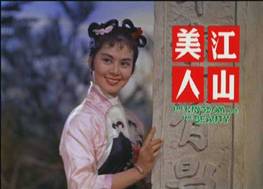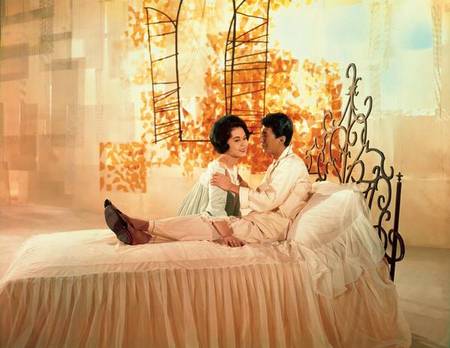 |
Statistics :
11630 Movies
19215 People
1448 Studios
29 Articles
73 Interviews
12 DVD Reviews
32452 Screenshots
3722 Videos
|
|
 |
 |
A heroine for diasporic Chinese fans |
1/1 - Page 3 |
 |
 |
 |
 |
 |
|

|
However, strength is tinged
with melancholy in Linda Lin
Dai's films as well as in her off-screen life. As the three
costume films in this retrospective (DIAU CHARN, BEYOND THE GREAT WALL, and THE LOTUS LAMP) indicate, Chinese audiences, after
decades of bloody civil wars, revolutions, invasions, and colonization,
welcomed a vision of Chinese history that unified its audience and allowed
it to fantasize about an “imaginary” nation that transcended physical
borders. Although these tales often ended tragically for the heroines who
sacrificed themselves for the greater good of the Chinese nation, these
fantasies also offered hope to people displaced by war, revolution,
economic upheavals, and social unrest. A beauty who could transcend the
limitations of historical time and physical space, Linda Lin Dai could
serve as the cynosure of all the unfocused longings, regrets, doubts, and
desires of her diasporic Chinese fans.
At that time, Hong Kong
cinema had quite a bit in common with its close competitor Japan. Hong
Kong and Japan hoped to draw in a regional audience to films that would
speak first to an ethnic Japanese or Chinese audience, but also manage to
find a niche on screens across Asia. Like Japan under the American
Occupation and post-Occupation American influence, colonial Hong Kong
modeled its industry on Hollywood (another export industry with a large
local base) and on the increasingly popular Hollywood-style films being
made in Japan. Just as Japan revived the samurai film after the American
authorities allowed costume dramas to be produced after banning them as
promoting “feudalism” and Emperor-worship, Hong Kong helped to cash in on
the popularity of historical films among Chinese audiences by producing
lavish Chinese opera productions and huang mei romances.
Also, taking a cue from Japan, Hong Kong studios began to make a series of
highly successful Mandarin musicals patterned on the Japanese version of
the Hollywood standard.
|
 |
 |
| The Kingdom
and The Beauty, the most acclaimed Huangmei diao with
Linda Lin Dai. |
modern musicals |
Although the genre is most
often associated with the Shaws’ archrival, MP and GI/Cathay (under the leadership of Dato
Loke Wan-tho until his death in a plane crash), the musical also formed a
staple part of the Shaw Brothers’ output during this era. In fact, a
former MP and GI director who had begun his career in Shanghai, Tao Qin,
directed the two modern musicals featured in this retrospective, LES BELLES and LOVE PARADE, both starring Peter Chen Hou and Linda Lin Dai as a romantic
team. (Tao Qin also helmed Lin Dai’s best known melodramatic epics,
LOVE WITHOUT END and THE BLUE AND THE
BLACK.)
|

Linda Lin
Dai and Peter Chen Hou. |
Both Les Belles and
Love Parade showcase Linda Lin Dai’s formidable talents as a
comedienne. Les Belles, for example, features Chen Hou and Lin Dai
in a love-hate relationship in which they “hate” each other in person as
they work together as part of a musical theatre troupe with very different
opinions on how things should be run and “love” each other through a
series of anonymous billets-doux in which they court. Love
Parade offers a similar storyline with the Chen Hou and Lin Dai
characters disliking each other at first, marrying, suffering through a
trying honeymoon, and finally reconciling at the end. Both films offer
spectacular musical numbers, cosmopolitan references to Japan, America,
and Europe, and elaborate fashions that showcase Linda Lin Dai’s beauty,
grace, and poise. |
|
|
| |
 |
|
|
Page :
1
2
3
4
Top
|
|
|
|
|
|
|
 |
